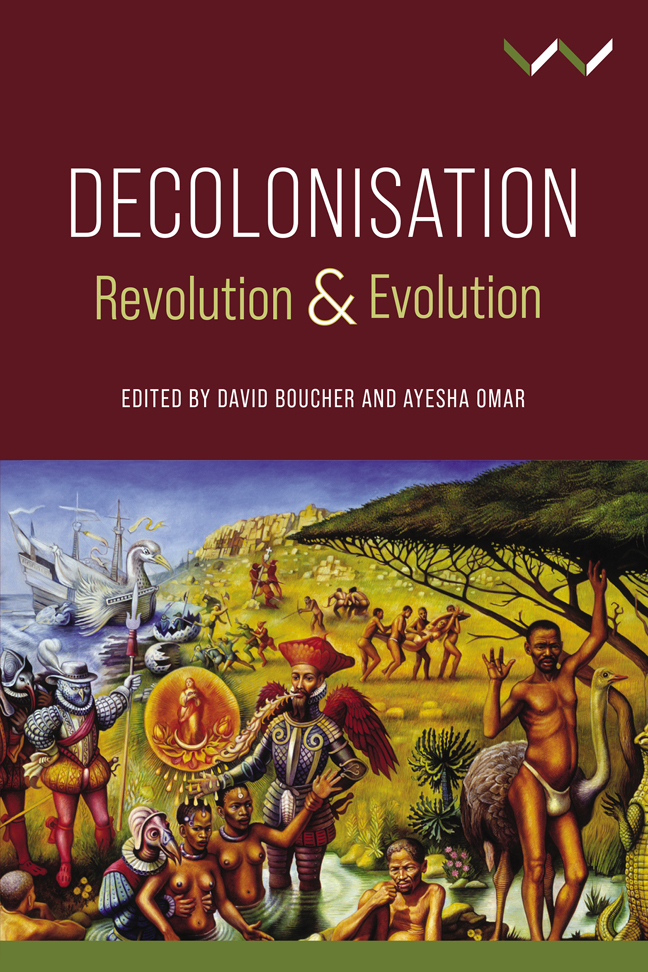Book contents
- Frontmatter
- Contents
- Acronyms
- Introduction: Decolonisation: Interdisciplinary Perspectives
- Chapter 1 The Invention of Blacks: Notes on Conquest, Fear and Time
- Chapter 2 The Decolonisation of Southern Africa: Historical Reflections
- Chapter 3 The Border of Trust at Kat River for Coloured Settlers, 1851–1853
- Chapter 4 Decolonisation and the Enduring Legacy of Colonial Borders in Africa
- Chapter 5 Fanon's Challenge: Identity, Recognition and Ideology
- Chapter 6 Beyond Redemption: Unsettling Progressive-Romantic Storyings of Colonial Injustice in Western Critical Thought
- Chapter 7 The Limits of Decolonisation and the Problem of Legitimacy
- Chapter 8 Decolonisation – Real and Imagined
- Chapter 9 Decolonisation and the Crisis of African Literature in the Twenty-First Century
- Chapter 10 Pedagogical Disobedience in an Era of Unfinished Decolonisation
- Contributors
- Index
Introduction: Decolonisation: Interdisciplinary Perspectives
Published online by Cambridge University Press: 01 March 2024
- Frontmatter
- Contents
- Acronyms
- Introduction: Decolonisation: Interdisciplinary Perspectives
- Chapter 1 The Invention of Blacks: Notes on Conquest, Fear and Time
- Chapter 2 The Decolonisation of Southern Africa: Historical Reflections
- Chapter 3 The Border of Trust at Kat River for Coloured Settlers, 1851–1853
- Chapter 4 Decolonisation and the Enduring Legacy of Colonial Borders in Africa
- Chapter 5 Fanon's Challenge: Identity, Recognition and Ideology
- Chapter 6 Beyond Redemption: Unsettling Progressive-Romantic Storyings of Colonial Injustice in Western Critical Thought
- Chapter 7 The Limits of Decolonisation and the Problem of Legitimacy
- Chapter 8 Decolonisation – Real and Imagined
- Chapter 9 Decolonisation and the Crisis of African Literature in the Twenty-First Century
- Chapter 10 Pedagogical Disobedience in an Era of Unfinished Decolonisation
- Contributors
- Index
Summary
A global history of the contemporary world is marked by the displacement, dispossession and domination forged by the colonial and imperial encounter. Colonialism and imperialism have been widely accepted as systems of exploitation, dependent upon the devaluation of the languages, cultures and control of colonised subjects systematically cast as ontologically inferior. Colonialism, constitutive of modernity, as Jean- Paul Sartre argues, was not the accumulation of individual undertakings and chance occurrences, but instead an elaborate system that emerged around the mid-nineteenth century, representing moments of rise and decline (2001, 38). As Mahmood Mamdani contends, colonialism forcibly inscribed law, custom, education, language and community, citing the dichotomies of primitive versus civilised and the division of people along tribal, ethnic and racial lines (2020, 2–3). Yet, the second half of the twentieth century is instantiated by powerful acts of resistance, with the challenge to, and decline of, colonialism. During this period, colonial subjects rejected the coloniser, prompting waves of decolonisation in many parts of the world. While modern colonialism and imperialism have been extensively examined in terms of their economic, military and political motivations, decolonisation requires further and more nuanced study.
Decolonisation as a conceptual term relates to more than just a set of historical processes signalling the demise of colonialism. While definitionally it is associated with the historical process of political independence of former colonies – events locatable in time, geography and political praxis – in recent times it has become a floating signifier for a range of contemporary struggles against injustice. Decolonisation can thus at once be construed as a normative idea, a political and economic ideal, or an epistemic project, demonstrating the unsettled nature of its use. The task of this book is to think productively, through various sites and contexts, about the uses and meanings of the term decolonisation, so as to provide complexity to our contemporary understanding. As such, it is interested in exploring the multiplicity of ways in which decolonisation has evolved and the various modes of its articulation. The book proceeds from an interdisciplinary vantage point, drawing together a series of arguments in social and political thought, intellectual and economic history, literary studies, political theory and development studies. These interdisciplinary approaches, as the book demonstrates, conceive of decolonisation from a range of perspectives: as a historical or empirical political process, a problem of political and philosophical theory, and through the lens of epistemic justice.
Information
- Type
- Chapter
- Information
- DecolonisationRevolution and Evolution, pp. 1 - 26Publisher: Wits University PressPrint publication year: 2023
